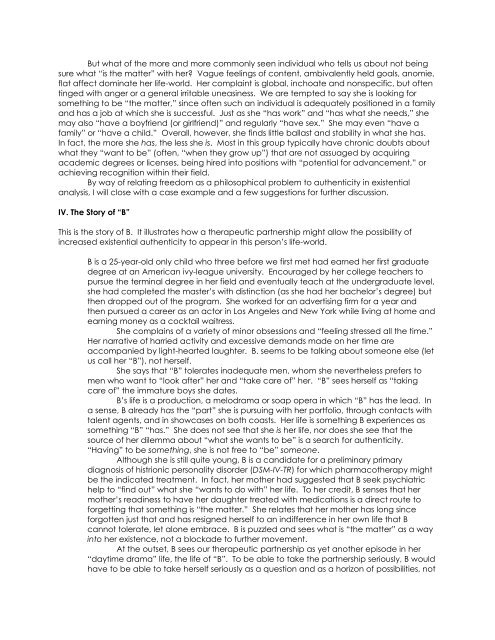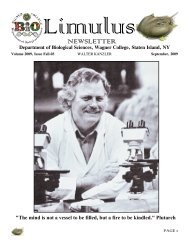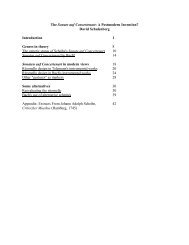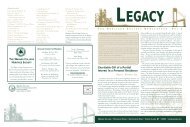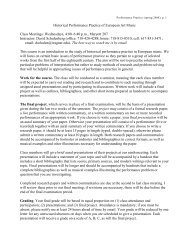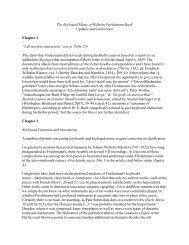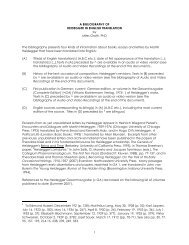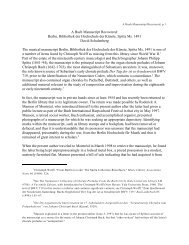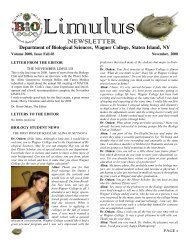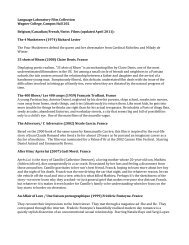SEVEN PAPERS ON EXISTENTIAL ANALYSIS ... - Wagner College
SEVEN PAPERS ON EXISTENTIAL ANALYSIS ... - Wagner College
SEVEN PAPERS ON EXISTENTIAL ANALYSIS ... - Wagner College
You also want an ePaper? Increase the reach of your titles
YUMPU automatically turns print PDFs into web optimized ePapers that Google loves.
But what of the more and more commonly seen individual who tells us about not being<br />
sure what “is the matter” with her? Vague feelings of content, ambivalently held goals, anomie,<br />
flat affect dominate her life-world. Her complaint is global, inchoate and nonspecific, but often<br />
tinged with anger or a general irritable uneasiness. We are tempted to say she is looking for<br />
something to be “the matter,” since often such an individual is adequately positioned in a family<br />
and has a job at which she is successful. Just as she “has work” and “has what she needs,” she<br />
may also “have a boyfriend (or girlfriend)” and regularly “have sex.” She may even “have a<br />
family” or “have a child.” Overall, however, she finds little ballast and stability in what she has.<br />
In fact, the more she has, the less she is. Most in this group typically have chronic doubts about<br />
what they “want to be” (often, “when they grow up”) that are not assuaged by acquiring<br />
academic degrees or licenses, being hired into positions with “potential for advancement,” or<br />
achieving recognition within their field.<br />
By way of relating freedom as a philosophical problem to authenticity in existential<br />
analysis, I will close with a case example and a few suggestions for further discussion.<br />
IV. The Story of “B”<br />
This is the story of B. It illustrates how a therapeutic partnership might allow the possibility of<br />
increased existential authenticity to appear in this person’s life-world.<br />
B is a 25-year-old only child who three before we first met had earned her first graduate<br />
degree at an American ivy-league university. Encouraged by her college teachers to<br />
pursue the terminal degree in her field and eventually teach at the undergraduate level,<br />
she had completed the master’s with distinction (as she had her bachelor’s degree) but<br />
then dropped out of the program. She worked for an advertising firm for a year and<br />
then pursued a career as an actor in Los Angeles and New York while living at home and<br />
earning money as a cocktail waitress.<br />
She complains of a variety of minor obsessions and “feeling stressed all the time.”<br />
Her narrative of harried activity and excessive demands made on her time are<br />
accompanied by light-hearted laughter. B. seems to be talking about someone else (let<br />
us call her “B”), not herself.<br />
She says that “B” tolerates inadequate men, whom she nevertheless prefers to<br />
men who want to “look after” her and “take care of” her. “B” sees herself as “taking<br />
care of” the immature boys she dates.<br />
B’s life is a production, a melodrama or soap opera in which “B” has the lead. In<br />
a sense, B already has the “part” she is pursuing with her portfolio, through contacts with<br />
talent agents, and in showcases on both coasts. Her life is something B experiences as<br />
something “B” “has.” She does not see that she is her life, nor does she see that the<br />
source of her dilemma about “what she wants to be” is a search for authenticity.<br />
“Having” to be something, she is not free to “be” someone.<br />
Although she is still quite young, B is a candidate for a preliminary primary<br />
diagnosis of histrionic personality disorder (DSM-IV-TR) for which pharmacotherapy might<br />
be the indicated treatment. In fact, her mother had suggested that B seek psychiatric<br />
help to “find out” what she “wants to do with” her life. To her credit, B senses that her<br />
mother’s readiness to have her daughter treated with medications is a direct route to<br />
forgetting that something is “the matter.” She relates that her mother has long since<br />
forgotten just that and has resigned herself to an indifference in her own life that B<br />
cannot tolerate, let alone embrace. B is puzzled and sees what is “the matter” as a way<br />
into her existence, not a blockade to further movement.<br />
At the outset, B sees our therapeutic partnership as yet another episode in her<br />
“daytime drama” life, the life of “B”. To be able to take the partnership seriously, B would<br />
have to be able to take herself seriously as a question and as a horizon of possibilities, not


